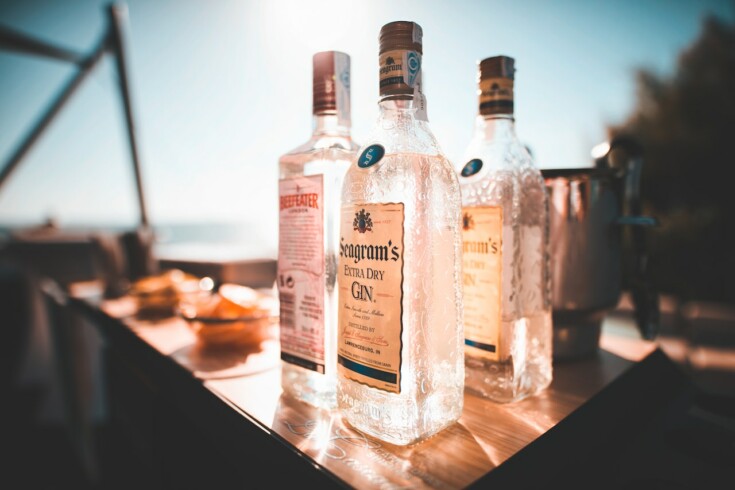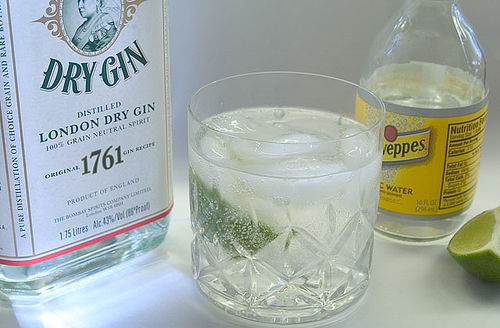
Gin is a popular alcoholic beverage that has been enjoyed by many for centuries. It is a versatile spirit that can be mixed with a variety of ingredients to create a wide range of cocktails. However, like all alcoholic beverages, gin has a shelf life and can go bad over time.
Table of Contents
Understanding Gin
Gin is a popular distilled spirit that has been around for centuries. It is a clear, juniper-flavored spirit that is commonly used in cocktails. Gin is made by distilling a neutral grain spirit with a variety of botanicals, including juniper berries, coriander, angelica root, and citrus peel.
Gin Production
Gin production involves several steps, including fermentation, distillation, and blending. The first step in gin production is to ferment a neutral grain spirit, such as wheat or barley. The fermented spirit is then distilled in a pot still or column still, which separates the alcohol from the water and other impurities. The resulting distillate is then blended with a variety of botanicals, which give gin its characteristic flavor.
There are several different types of gin, including London Dry Gin, Old Tom Gin, and Plymouth Gin. Each type of gin has its own unique flavor profile, which is determined by the specific botanicals used in the blending process.
Gin Ingredients
The main ingredient in gin is a neutral grain spirit, which is typically made from wheat or barley. The botanicals used to flavor gin can vary widely, but the most common botanical is juniper berries. Other botanicals that are commonly used in gin production include coriander, angelica root, orris root, and citrus peel.
In addition to these botanicals, some gins also contain other flavorings, such as cucumber, rose petals, or even truffles. These additional flavorings can give gin a more complex flavor profile.
 photo credit: wikimedia.org
photo credit: wikimedia.org
Does Gin Go Bad?
Gin has a unique flavor profile that makes it a favorite among many people. But, like all other alcoholic beverages, gin can go bad.
The good news is that gin has a long shelf life. Like other hard spirits, gin can stay safe for consumption indefinitely. The high alcohol content within the spirit won’t be a safe habitat for mold or bacteria to grow. However, the flavor and aroma of gin can change over time, and it can start to taste sour or musty.
When properly stored in a cool, dark place, gin can last for at least five years before going bad. It is essential to keep the bottle tightly sealed to prevent air from entering, which can cause oxidation and affect the taste of gin.
It is also important to note that gin can become more potent over time. The alcohol content can increase, making it potentially dangerous to drink. Therefore, it is crucial to check the alcohol content before consuming gin that has been stored for a long time.
Factors Influencing Gin’s Shelf Life
Storage Conditions
Gin should be stored in a cool, dark place, away from direct sunlight. Exposure to light can degrade the quality of gin over time, so it’s best to keep it in a cabinet or pantry. Temperature is also important, as gin should be stored at a consistent temperature, ideally between 50°F and 70°F (10°C and 21°C). Extreme temperatures can cause the gin to expand or contract, which can affect the flavor and quality of the gin.
Humidity is another factor to consider when storing gin. High humidity can cause the cork to degrade, which can lead to air getting into the bottle and affecting the flavor of the gin. It’s best to store gin in a dry environment to prevent this from happening.
Open vs Unopened Bottles
Once a bottle of gin is opened, its shelf life can be affected by a number of factors. Oxygen is one of the biggest culprits, as exposure to air can cause the gin to oxidize and lose its flavor over time. To prevent this, it’s important to keep the bottle tightly sealed and store it upright. It’s also a good idea to consume the gin within a reasonable amount of time after opening, as the longer it sits, the more the flavor can deteriorate.
Another factor to consider is the amount of gin left in the bottle. The less gin there is, the more air there is in the bottle, which can accelerate the oxidation process. To prevent this, it’s a good idea to transfer the remaining gin to a smaller bottle or container to minimize the amount of air in the bottle.
Signs of Spoiled Gin
While gin doesn’t technically spoil, it can lose its flavor and quality over time. Here are some signs that your gin may have gone bad:
- Off Odor: If your gin has a strange or unpleasant odor, it may be a sign that it has gone bad. Fresh gin should have a clean and aromatic smell. If it smells musty, moldy, or sour, it’s likely that the gin has spoiled.
- Change in Color: Gin should be a clear liquid. If it has changed color and appears cloudy or has a yellowish hue, it may have gone bad.
- Off Taste: If your gin tastes different than what you’re used to, it may have gone bad. Gin that has gone bad may taste sour or bitter.
- Sediment: If you notice sediment at the bottom of the bottle or floating in the gin, it may have gone bad. This could be a sign of mold or bacteria growth.
- Fizziness: If your gin is fizzy or has bubbles, it may have gone bad. This could be a sign of fermentation or bacteria growth.
If you notice any of these signs, it’s best to dispose of the gin and purchase a new bottle. It’s important to store gin properly to prevent it from going bad. Keep it in a cool, dark place away from direct sunlight and heat. Avoid storing it in the refrigerator or freezer, as this can alter the flavor and quality of the gin.
Gin and Health Risks
While moderate drinking of gin has some health benefits, heavy drinking can lead to various health risks. According to WebMD, heavy drinking can increase the risk of high blood pressure, coronary artery disease, heart failure, and ischemic stroke. Therefore, it is important to consume gin in moderation to avoid these health risks.
It is also worth noting that gin, like any other alcoholic beverage, can be addictive. Excessive drinking of gin can lead to alcoholism, which can cause a range of health problems, including liver damage, mental health issues, and an increased risk of accidents.
Furthermore, drinking gin while taking certain medications can be dangerous. For example, drinking gin while taking antidepressants, antihistamines, or painkillers can increase the risk of side effects and adverse reactions. Therefore, it is important to consult a healthcare professional before consuming gin if you are taking any medication.
Proper Gin Storage
Gin is a popular alcoholic beverage that is enjoyed by many people around the world. To ensure that the gin stays fresh and retains its flavor, it is important to store it properly.
Temperature
Gin should be stored at room temperature or slightly cooler. The alcohol content in gin is strong enough to make it shelf-stable and prevent bacterial growth. Therefore, gin can safely stand outside the fridge between 55 and 60 °F (or 12 and 16 °C). However, some people prefer to keep it in the refrigerator or freezer because gin is best served chilled.
Light and Air Exposure
Gin should be stored in a cool, dark place away from direct sunlight. Exposure to light and air can cause the gin to lose its flavor and aroma. Therefore, it is recommended to store gin in a dark cabinet or pantry.
Bottle Position
The position of the bottle can also affect the quality of the gin. Gin bottles should be stored upright to prevent the cork or cap from deteriorating and affecting the flavor of the gin.
Shelf Life
Gin has a long shelf life and can stay safe for consumption indefinitely. However, the flavor and aroma of the gin can change over time. Once opened, gin can last for several years if stored properly. It is recommended to consume the gin within six months to a year after opening for optimal flavor.
Proper storage of gin can ensure that the flavor and aroma are preserved for a longer period of time. By following these guidelines, gin lovers can enjoy their favorite drink for a long time.
Frequently Asked Questions
Does gin expire if unopened?
No, an unopened bottle of gin can last indefinitely as long as it is stored properly. The high alcohol content of gin, typically around 35%, makes it inhospitable to bacteria and mold growth. As long as the bottle is kept in a cool, dry place away from direct sunlight, it should remain safe to consume.
How should gin be stored after opening?
Once opened, gin should be stored in a cool, dry place away from direct sunlight. It is recommended to keep the bottle tightly sealed to prevent evaporation and oxidation. Some people prefer to store gin in the refrigerator or freezer, but this is not necessary as long as the bottle is kept at a consistent temperature.
Can gin go bad in high temperatures?
Exposure to high temperatures can cause gin to degrade more quickly, but it is unlikely to spoil or become dangerous to consume. However, extreme temperatures can cause the gin to evaporate more quickly and change the flavor profile. It is best to store gin in a cool, dry place to maintain its quality.
Is it safe to drink very old gin?
While gin does not technically expire, the flavor and quality may deteriorate over time. Very old gin may develop a stale or musty taste, and the botanical flavors may become muted. It is generally safe to consume old gin, but it may not taste as good as a fresh bottle. It is recommended to use your discretion when deciding whether to drink old gin.
Conclusion
Gin has a long shelf life and can stay safe for consumption indefinitely. The high alcohol content within the spirit makes it an inhospitable environment for mold or bacteria to grow, reducing the risk of spoilage.
However, the flavor and quality of gin can deteriorate over time, especially if the bottle is opened. It is recommended to finish a bottle of gin within two years of opening it and store it properly in a cool, dry, and dark place away from sunlight, heat, and moisture.
If you forget your glass of gin for a day or two, it may still be safe to drink, but the taste and quality may have degraded. It is better to err on the side of caution and discard it if in doubt.
Related Posts
Here are some related posts about gin that you might find interesting. These posts provide a wealth of information about gin, including its history, production methods, and flavor profiles. Whether you’re a gin enthusiast or just looking to learn more about this popular spirit, these posts are definitely worth a read:
- 3 gins to celebrate World Gin Day: This post discusses three different gins that are perfect for celebrating World Gin Day. The post includes information about each gin’s flavor profile and origin, as well as tasting notes.
- Daffy’s Gin: the most cosmopolitan of Scottish gins (giveaway inside!): This post takes a closer look at Daffy’s Gin, a Scottish gin that is known for its unique flavor profile. The post includes information about the distillery where the gin is made, as well as tasting notes and a recipe for a gin and tonic.
- Scotland to play central part in craft gin resurgence: This post discusses the recent resurgence of craft gin in Scotland. The post includes information about some of the most popular Scottish gins, as well as the distilleries where they are made.
- Know your Gin Geography : 4 capitals, 4 gins !: This post takes a look at four different gins from four different countries. The post includes information about each gin’s flavor profile and origin, as well as tasting notes.



